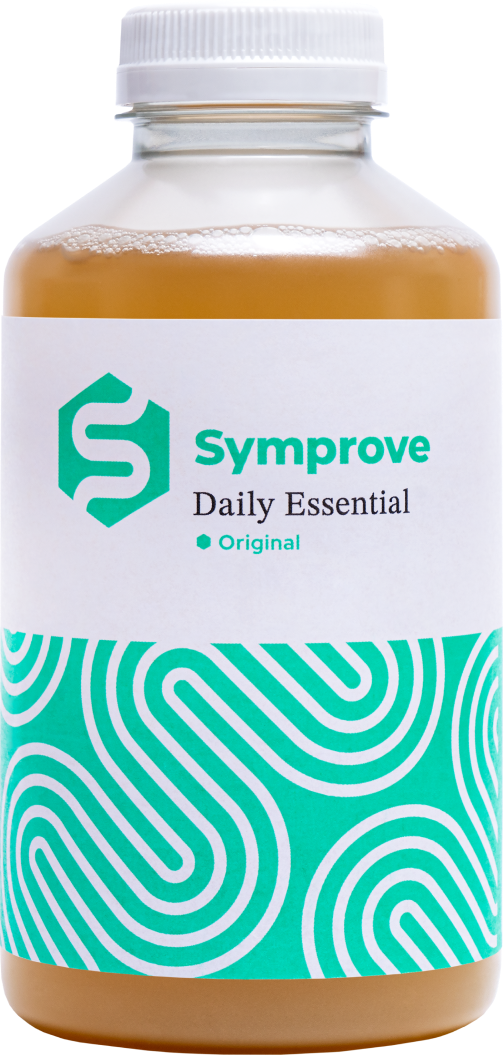Given the putative role of the microbiome in the pathology of coeliac disease, research also focused on its modulation as a potential therapeutic target. Probiotics, commonly defined as “live microorganisms which, when administered in adequate amounts, confer a health benefit on the host” have been proposed as one way to achieve this. (1)
Probiotics potentially could have different therapeutic effects in coeliac disease:
-
The ability to digest gluten proteins to non-immunogenic polypeptides
-
Reduce permeability of the intestinal barrier, preventing the access of autoimmunogenic gluten proteins to the intestinal mucosa
-
Reverse ‘dysbiotic’ microbial profiles and regulate innate and adaptive immune function
-
Clinical improvement of persistent symptoms in patients on a strict GFD (2,3)
Further research is required to clarify if different probiotic species can improve intestinal permeability and reduce gluten’s immunogenic effects. However, one possible future clinical application maybe as a treatment option for patients who present with ongoing symptoms despite careful adherence to the GFD. (4,5)
While most individuals clinically improve after commencing a GFD, up to 30% of patients continue to experience symptoms. (6–8) Clinical pathways for patients with non-responsive coeliac disease (NRCD) have been published. (9,10) Figure 1 summarises current NRCD protocols, a central component of which is a repeat duodenal biopsy to reassess mucosal inflammation. In patients with NRCD where histology and dietetic assessment supports dietary adherence and mucosal recovery concomitant diagnosis of functional disorders such as irritable bowel syndrome (IBS) can be considered. (11)
Treatment of these patients has primarily focused on pharmaceutical or dietary therapies such as the dietitian led low FODMAP approach. (12–15) However, a systematic review and meta-analysis of randomised control trials (including 5279 participants) by Seiler et al (2020) evaluated the efficacy of probiotics in improving gastrointestinal (GI) symptoms and quality of life in patients with coeliac disease. The overall summary indicated:
-
Probiotics significantly improved GI symptoms when assessed by the GI Symptoms Rating Scale (P = 0.0002)
-
There was no difference in GI symptoms after probiotics when different symptom questionnaires were pooled
-
Levels of Bifidobacteria increased after probiotics use (P = 0.0003)
-
There were insufficient data on QOL for probiotics compared with placebo
-
No difference in adverse events was observed between probiotics and placebo (16)
The review concluded probiotics may improve GI symptoms and are unlikely to cause harm in patients with coeliac disease, but high-quality clinical trials are needed from wider geographical areas to assess the effects of specific bacteria and elucidate their potential mechanisms. A more recent systematic review focusing primarily the effect of probiotics on cardiovascular risk, broadly agreed with the findings of the Seiler review concluding there is very sparse data on outcomes related to probiotics use and cardiovascular risk in coeliac disease. (17)
With future research hopefully we will be able to offer specific advice on optimal species, timing, and dosage of probiotics that may benefit patients with coeliac disease. Currently if patients wish to trial probiotics, we need to discuss the current evidence base – and its limitations – so patients can make an informed choice. For those electing to try probiotics they are unlikely to do harm but we must emphasise a lifelong GFD is still the primary treatment for people with coeliac disease.
Figure 1: Investigation And Treatment Of Patients With Non-Responsive Coeliac Disease And Ongoing Symptoms

References
- WHO. Health and Nutritional Properties of Probiotics in Food including Powder Milk with Live Lactic Acid Bacteria. in (2001).
- Zolnikova O, et al. Microorganisms 2023;11:2848.
- Saviano A, et al. Biomedicines 2023;11:1–12.
- Moawad, MHE, et al. World J Clin Cases 2023;11:7741–4.
- Mozafarybazargany M, et al. Clin Exp Med 2023 doi:10.1007/s10238-022-00987-x.
- Vuolle S, et al. BMJ Open Gastroenterol 2022;9e000914.
- Schiepatti A, et al. Digestive and Liver Disease 2021 doi:10.1016/j.dld.2021.02.019.
- Galli G, et al. Nutrients 2021;13:1–13.
- Penny HA, et al. Nutrients 2020;12:216.
- Mooney PD, et al. Journal of Gastrointestinal and Liver Diseases 2012;21:197–203.
- Sainsbury A, et al. Clinical Gastroenterology and Hepatology 2013;11:359-65.
- Harnett J, et al. Evidence-based Complementary and Alternative Medicine 2016.
- Klemenak M, et al. Dig Dis Sci 2015;60:3386–92.
- Olivares M, et al. British Journal of Nutrition 2014;112:30–40.
- Smecuol E, et al. J Clin Gastroenterol 2013;47:139–47.
- Primec M, et al. Clinical Nutrition 2019;38:1373–81.
- Quagliariello A, et al. Nutrients 2016:8.



